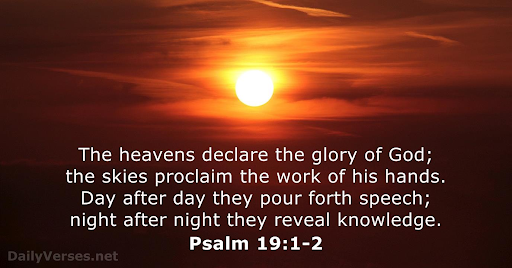"The heavens declare the glory of God; the skies proclaim the work of his hands" (Ps 19:1). "But who can discern their own errors? Forgive my hidden faults. Keep your servant also from willful sins; may they not rule over me.
Then I will be blameless, innocent of great transgression. May these words of my mouth and this meditation of my heart be pleasing in your sight, Lord, my Rock and my Redeemer" (Ps 19:12-14).- How does the OT Torah relate to us as Christians?
The self-revelation of God (Three Voices in Harmony). C.S. Lewis says that Psalm 19 is "the greatest poem in the Psalter and one of the greatest lyrics in the world." It contains the clearest summary of the doctrine of revelation in the OT, namely that God has made himself known to all people as:
- Creator (Ps 19:1-6): General revelation. The revelation of creation/nature. i) Revelation of God in the heavens (1-4b). ii) The all-seeing sun (4c-6).
- Lawgiver (Ps 19:7-10, 11): Special revelation. The revelation of God's law.
- Redeemer (Ps 19:11-14): Personal revelation. Human response. Prayerful reflection.
- John Stott. Favorite Psalms. 1988. Psalm 19: The self-revelation of God.
- Tim Keller. The Songs of Jesus. 2015.
- Gerald Wilson. Psalms Vol 1. The NIV Application Commentary. 2002.
- John Goldingay. 2013. Psalm 19: The mystery of sin.
- Kidner. Psalms 1-72, 1973. 1975. Psalm 19: The Skies, the Scriptures. 1. The eloquence of nature (Ps 19:1-6). 2. The clarity of Scripture (Ps 19:7-14).
- Alec Motyer. Psalms by the Day. 2016. Psalm 19: Three voices in harmony.
- Longman III, Garland. 2008. God's Perfections Revealed in Work and Word. God's Glory in Creation; Perfection of God's Word; Commitment to Integrity.
- The Revelation of Creation (Ps 19:1-6). i) The Revelation of the Skies (Ps 19:1-4b). ii) The Revelation of the Sun (Ps 19:4c-6).
- The Revelation of God's Law (Ps 19:7-11).
- Prayerful Reflection (Ps 19:12-14).
Psalm 19 has resonated deeply with theologians, authors, pastors, poets, and musicians alike, inspiring reflections on the beauty of creation, the clarity of divine revelation, and the transformative power of God's Word. Its verses continue to influence spiritual and artistic expressions across cultures and generations.
- Augustine saw Psalm 19 as celebrating God's revelation through both nature (Ps 19:1-6) and Scripture (Ps 19:7-14), emphasizing the dual nature of God's communication to humanity.
- C.S. Lewis called Psalm 19 "the greatest poem in the Psalter and one of the greatest lyrics in the world."
- Calvin emphasized how Psalm 19 shows God's revelation through both nature and scripture.
- Spurgeon referred to Psalm 19 as "The Heavens and the Word," highlighting its dual focus on general and special revelation.
- Isaac Watts paraphrased Psalm 19 in his hymn "The Heavens Declare Thy Glory, Lord."
- Matthew Henry noted how Psalm 19 presents God's glory in creation, the word, and the heart of believers.
- Gerard Manley Hopkins was inspired by Psalm 19 in his poem "God's Grandeur," which echoes themes of divine glory in nature.
- Jonathan Edwards used Psalm 19 to argue for the harmony between natural and biblical revelation.
- John Milton, in his poem "Paradise Lost," references Psalm 19 in describing the beauty of God's creation and the heavens declaring His glory.
- Martin Luther saw Psalm 19 as a prophecy of the spread of the Gospel throughout the world.
- Rabbi Abraham Joshua Heschel used Psalm 19 to discuss the concept of divine pathos and human wonder.
- N.T. Wright, in several of his writings, discussed themes of natural revelation and the moral law and the integration of God's creation and Torah.
- Tim Keller often refers to Psalm 19, discussing its implications for understanding God's revelation through both nature and Scripture.
- Bach composed a famous choral work, "The Heavens Declare the Glory of God," based on Psalm 19:1.
- Joseph Haydn's oratorio "Die Schöpfung" (The Creation) draws on themes of creation and divine revelation, echoing Psalm 19.


No comments:
Post a Comment